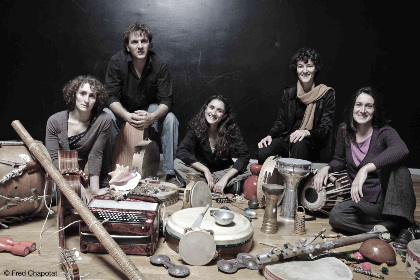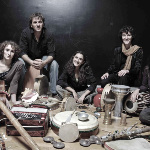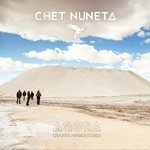
Songs
- country:France
- style(s):A Cappella, Acoustic
- label:Mon Slip
- type:Band
- gender:female
- instrumentation:instrumental, vocal
- artist posted by:Vivement ce Soir
Line up
- Daphne Clouzeau (voice)
- Juliette Roussille (voice)
- Lilia Ruocco (voice)
- Michael Fernandez (percussion)
- Valerie Gardou (voice)
Links
IMAGINARY NEO-FOLKLORE!
After crisscrossing mythic lands and improbable countries and visiting the world’s spirits, CHET NUNETA offers us a first album of remarkable beauty.
One of the group’s members, Daphné Clouzeau, with a graduate degree in the performing arts, was inspired by clown art, the second, Valérie Gardou, literature by way of the theater, the third, Juliette Roussille, a trained anthropologist, by gestural theater. The three of them, linked by in-depth training in vocal techniques and song, met at the Samovar, a performing arts training center. In October 2000, they gave a performance as a trio, interpreting world music a cappella. The mutual jubilation that followed encouraged them to continue.
They became the Enchantêtues, broadening and deepening their repertory through contacts with associations, street artists, research and vocal training. Their efforts led to being asked to display their talents, at the start of 2004, at the Orsay Museum’s “Springtime of Poets”, then being invited to perform with the Têtes Raides at the Bataclan. The group’s leader, Christian Olivier, proposed that they record on their label Mon Slip. Working in a studio radically changed the landscape. It encouraged them to bring in two new partners with which they had been holding discussions. Lilia Ruocco (a member of the Teatro Natura and an art therapist) contributed her anchoring in the vocal tradition of southern Italy and her “physical” approach to song, which she owed to Maud Robart’s Haitian vibratory song and Giovanna Marini and Silvia Malagugini’s polyphonic vocals. The percussionist Michaël Fernandez (a globe-trotter on a quest for rhythms, influenced by Indian ghatams, flamenco and traditional European song) proved to be the “colorist” they needed.
So the Chet Nuneta – an anagram of Enchantêtu – was born, deriving its legitimacy from the intertwining of the members’ unusual paths. Their magic is the alchemy of five fine temperaments and raw material, the traditional song, a heritage filled with the mysterious fluid of peoples to be handled with care. Where does this heritage come from? What condition is it in? How is it to be used? Rejecting the false orthodoxy of mimicry, wanting to be more faithful to spirit than to form, wishing to revisit it through the lens of their Western sensibilities, the Chet Nuneta invent their own recipes. If a melody captivates them, they endeavor to capture its essence and combine it with their own spices. The result is a dawning feeling of intuitions and moods based on research into timbres, rhythms, words and vocal effects. Could we call it imaginary neo-folklore?
For a first taste, we can imagine traveling with this first opus, Ailleurs, from a Russian isba to a night in Cape Verde, from an Arabic caravansary to a Madagascan community. National “hits” (such as La Llorona, known by every Mexican, or “Erev Shel Shoshanim”, a counting rhyme in Hebrew) are found alongside songs whose pedigrees are not as well established. We find a series of moods that embrace a gamut of emotions ranging from the mystic bliss of Ayazin to the grief of Khot Ti Shla, from the mischievousness of Capelli to the festiveness of Sedyankata, a voyage of feelings that play on purity and simplicity as much as on a sometimes iconoclastic substitution.
So the demonic mood of A Vus Basin is intensified by the whisperings and inclusion of part of the witches’ speech in Macbeth. Ya Man Laebat, a song derived from the great tradition of erotic-mystical Arabic poetry, through an original ensemble of instruments (berimbau, karkabu, the organ’s harmonic flute similar to the nay) takes on accents of the Sufi trance. And Miinan Laulu, a melody borrowed from the four Finnish singers from Värttinä, has its Nordic exoticism heightened by a play of tablas. What it comes down to, whatever the eulogists of a fallacious authenticity might think, is that a living tradition is a perpetual, sometimes transgressive recreation, and it is this “authenticity” that the Chet Nuneta mean to respectfully free themselves of.
After all, Western culture has been enriching itself with crossbreeding for decades now and it is legitimate to also lay claim to this tradition, all the more so as the performing arts have replaced the ancient legitimacy of these songs (rites, festivals, labor in the fields), which the group enriches with its experiences in theater and the results of its training and research, by a new function. This is one way of saying that between the local and the universal, yesterday and today, the Chet Nuneta, whose staging is an essential dimension, are opening up infinitely captivating musical vistas.
Frank Tenaille



